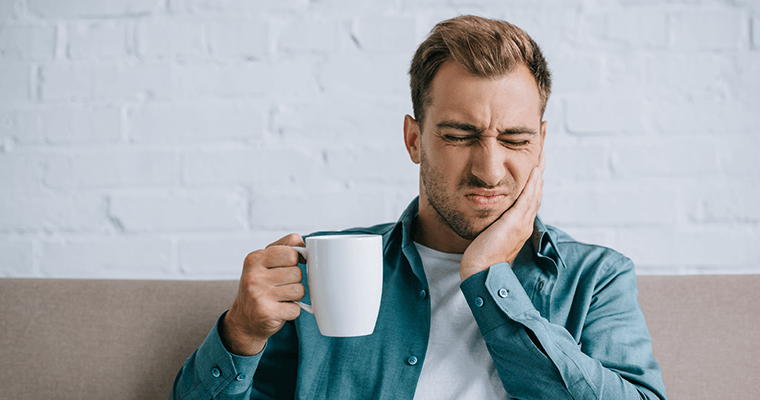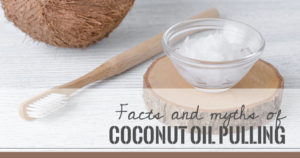Why Do My Teeth Hurt?

We’ve all been there before, enjoying an otherwise excellent day when, wham, toothache hits you like a truck.
At that point, there are only two questions on your mind: “Why do my teeth hurt?” and “How to make it stop?”
And both are fair questions.
But, the thing is, not all toothaches are made equal.
So, let’s take a look at more specific situations.
Then, and only then, will we be able to make that nasty toothache disappear.
Why Do My Teeth Hurt When I Eat Sweets?
It’s unfortunate, isn’t it? Sweets are, as the name suggests, quite sweet and tastylicious more often than not.
But, as far as your teeth are concerned, sweets are the worst.
In fact, from where teeth stand, sweets are a serious double whammy.
First, sugary substances damage teeth, making them more sensitive. The reason?
Sugary foods contain fermentable carbohydrates, and these fellows remove minerals from tooth enamel, making teeth weak (and not in the knees).
Second, most sweets are highly acidic, contributing to further tooth erosion.
Unless the acid is rinsed or brushed away, it serves as an invitation to bacteria and its trusty partner plaque.
The worst offenders are:
- Hard sweets (that’s both candies and cough drops). Assuming you don’t spit them out or swallow these sweets in a minute, they generate a lasting acid bath. And that’s not the bath you want your teeth to take.
- Sticky and gummy sweets. We’re talking about everyone’s favorite gummy bears, dried fruit, honey, etc. Because they always stick to teeth, these sweets give bacteria ample time to grow.
- Carbonated soft drinks. ‘Cause, they’re not just teeming with sugar, but also highly acidic.
And, sorry, but the solution is simple – don’t consume these sweets or, at the very least, go easy on ‘em.
Why Do My Teeth Hurt When I Bite Down?
Yes, at times, your tooth will only hurt when you bite down.
Sometimes, that means biting down on food. Sometimes, on nothing at all.
The exact symptom will always depend on the underlying cause.
And, more often than not, it is one of these three:
- Cracked tooth
- Decayed tooth
- Loose filling
A crack in the tooth usually occurs when you bite down on something hard or when that ‘something’ has a large filling. In both cases, you can often cause hairline fractures in the affected tooth. With time, these fractures lead to more sizable cracks. Once the tooth sustains damage, the pain will gradually increase.
When the culprit is tooth decay, that means the tooth is losing its strength, so to speak. And, when teeth become weak enough, they also become more susceptible to breakage. As you’d expect, that leads to pain.
And when we’re dealing with fillings on the loose, we’re dealing with a tooth that’s lost its protection. Exposed to harmful elements, the tooth starts hurting. The filling may even fall out with time, leading to substantial oral problems.
Whichever one is the cause, the solution is always to schedule a dental appointment. Because it’s never something you can treat at home without professional dental help.
Why Do My Teeth Hurt At Night?
A nagging toothache is always a terrible experience, but don’t you feel like they’re even worse at night?
You’re right, and there are several reasons why that’s true. These include:
- More Blood Flow
The reason toothache feels worse at night is due to the position we sleep in. Laying down means more blood rushing to the head, and that leads to extra pressure on our more sensitive areas, like the mouth. That painful sensation is not quite as throbbing during the day ‘cause we spend more time sitting and standing. - Fewer Distractions
Makes sense, right? We don’t stare at a screen at night, we don’t talk to people, we don’t listen to much and, ideally, we also don’t observe much. Therefore, even when the pain is actually not worse, it feels worse because we’re less distracted and more concentrated on it. - Late Meals
Yep, they’re coming back to bite you. With those tempting sweets after dinner or even more alluring midnight sugary snacks always comes sugar stuck between teeth or gums. And, because plaque loves sugar almost as much as we do, you can easily aggravate an already present toothache like that. - Teeth Grinding
Also known as bruxism, some people grind their teeth at night. Due to that, they may wake up writhing in pain because teeth grinding puts serious stress on the jaws, teeth, and gums.
The solution, unless we’re talking about a mild #3 case, is the same as in the previous case: schedule a dental appointment.
Before that, you can try to lessen the pain by taking an over-the-counter painkiller, applying something cold to the hurt area, and sleeping with your head elevated.
Why Do My Teeth Hurt When I’m Sick?
The last thing you want to feel when you’re sick is an extra source of pain. And, yet, that happens much more often than we’d like.
The good news is that there’s nothing unusual about it and the reason is quite straightforward.
You see, those sinuses that normally keep the nose clean and bacteria-free are located close to your upper teeth.
When you get sick, they become congested, swelling and placing pressure on teeth. As you can guess, that added pressure seldom feels good.
And, when you have some untreated oral health issue (say tooth decay), the pain can multiply.
The solution – go back to that over-the-counter analgesic, address the congestion issue, and schedule a dental appointment if the pain still persists after it.
Why Do My Teeth Hurt When I Drink Hot Beverages?
Alright, let’s speed things up. First, we need to time (or at least ballpark) the duration.
When the toothache lasts around 15 seconds or less, it’s usually nothing serious. Might be mild tooth decay, a loose filling, or minor gum recession. Of course, you should still schedule a dental appointment, but the issue unlikely requires emergency dental care.
When the toothache lasts around 30 seconds or more, we might be dealing with permanent damage to the tooth’s structure. The most popular reasons are:
- Too much coffee (and other acidic drinks and foods). We all love a hot drink every once in a while, and coffee is life fuel. But, like we’ve covered before, that acid leads to enamel loss, making teeth weak and sensitive to hot beverages.
- Chronic oral health concerns. In four out of five cases, tooth sensitivity starts at the gum line. So the people whose teeth hurt when they drink hot beverages usually have gum disease and soft tissue recession.
- Dental treatments. Dentists are people as well, so they don’t always get it right. Some tooth sensitivity after teeth whitening, cleaning, root planing, and dental crown or filling placement is perfectly fine. But if the pain continues for days or weeks (depending on the procedure), you should contact your dental office.
With these in mind, the solution may begin and end with using a straw and drinking acidic beverages less frequently. But, if that doesn’t cut it, schedule a dental appointment ASAP.
Why Do Cold And Hot Drinks Hurt My Teeth?
So, we’ve already established why hot drinks hurt our teeth.
With cold drinks, some of these reasons (like tooth decay, loose fillings, gum recession, and acidic foods) carry over as well.
But, more common for cold drinks, the reason may also be:
- Relentless tooth brushing. When you place too much pressure on your teeth, use an abrasive toothpaste, or choose a hard-bristled toothbrush, you can wear the enamel away, making your teeth sensitive to cold.
- Teeth grinding. Yes, bruxism rears its ugly head again. Be it tooth enamel loss or tooth chipping, cold sensitivity almost always follows bruxism.
- A crack in the tooth. Another repeated unwelcome guest, cracks and crevices in teeth can turn into large fissures, making the tooth enamel expand and contract with exposure to temperature changes. These cracks serve as another access point to the tooth’s nerve, leading to cold sensitivity.
The solution, besides the suggestions we’ve mentioned above, would include being more gentle with your teeth when you brush them and using a nightguard. But, again, if the pain persists, schedule a dental appointment with your family dentist as soon as you can.
Why Don’t We Make The Ache Go Away?

Our team at Smile Connections Family Dental would be happy to help you and answer any of your other questions!
Whatever the reason(s) may be, Our Wichita dentists are seasoned experts who’ll make a treatment plan tailored to your smile’s unique needs.
Because we don’t just treat teeth – we go above and beyond to make sure you leave our office with the proudest smile.
If you’re in the Wichita area, schedule a free consultation with Dr. James Volker.
Or contact us by:
- Phone: 316-722-8148
- Email: info@smileconnectionsdental.com
Our dental office in Wichita, KS…Get directions in a new window… proudly serves its neighboring communities, including Eastborough, Oaklawn-Sunview, Maize, Bel Aire, Park City, Goddard, Andale, Colwich, Clearwater, and Andover, KS.



